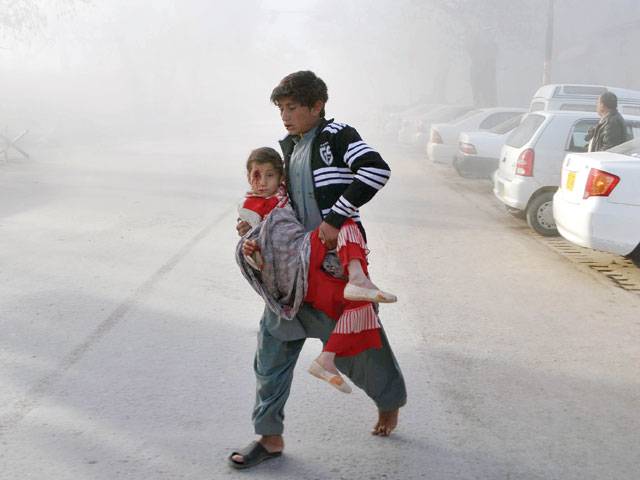QUETTA - Ten people including paramilitary soldiers were killed and more than 40 injured Saturday when a suicide bomber on a bicycle blew himself up near a security forces truck in Quetta.
Three of the dead were paramilitary soldiers while seven were civilians, officials said citing initial reports.
Pakistani Taliban spokesman Muhammad Khurasani told Reuters that the group, also known as the TTP, was responsible for the attack in Quetta.
The bombing was the latest in a region which is home to the planned route of a $46 billion China-Pakistan Economic Corridor.
The bombing took place at Multan Chowk outside district courts in Quetta where a truck was picking up soldiers who had been on a routine security patrol.
A paramilitary spokesman confirmed the bombing and said that three soldiers had died and 15 others had been wounded.
“At least three Frontier Corps personnel were killed and 15 were injured in the attack that occurred in the city centre in the late afternoon,” Frontier Corps spokesman Khan Wasey said.
The rescue teams rushed to the site and shifted the bodies and injured to Sandeman Civil Hospital. Later, some of the injured were referred to Combined Military Hospital due to their critical condition.
A 12-year-old girl was also among the dead, said Ajab Khan, a doctor at the Civil Hospital.
An emergency was declared in all nearby hospitals, where the 35 injured were being treated.
Senior police official Imtiaz Shah said that the suicide bomber was on a bicycle.
The police said that three vehicles of the security forces, one rickshaw, two motorcycles and one bicycle were damaged in the blast which also rocked the entire city and shattered the windowpanes of nearby buildings and offices.
The law enforcement agencies cordoned off the entire area and launched a search operation to trace out the suspects.
Initial reports by bomb disposal experts suggested that the explosives weighed up to 15 kilograms.
Mohammad Khurasani, a spokesman for the main Taliban group in Pakistan, claimed responsibility for the attack in a statement, saying the target was a Frontier Corps convoy. He provided no further details.
Balochistan Home Secretary Capt (r) Akbar Hussain Durrani confirmed the deaths and said “According to preliminary information, a suicide bomber riding bicycle detonated himself near the vehicles of security forces.” He said further investigation was underway.
He said that the anti-peace elements had started their terrorist activities in the city again after work was initiated on China Pakistan Economic Corridor (CPEC).He said the government would continue its efforts to provide security to life and property of people.
Anwarul Haq, a spokesman for the Balochistan government, confirmed the martyrdom of FC men in the terrorist attack.
“It is not an attack on FC, it is an assault on the state of Pakistan,” Haq said. “Our government strongly condemns the heinous act of terrorism.”
Prime Minister Nawaz Sharif strongly condemned the terrorist attack in Quetta causing loss of innocent lives.
According to a statement issued by the PM House in Islamabad, the prime minister directed the authorities concerned to provide best medical treatment to the injured.
He prayed for the departed souls and for the bereaved families to bear the loss with equanimity.
The prime minister also directed the officials of the law enforcement agencies to hunt down the culprits responsible for this terror attack.
Pakistan has seen a decline in militant attacks since launching a massive military operation in the northwestern tribal regions - a longtime stronghold of the Taliban - in the summer of 2014.
But the group retains the ability to carry out large attacks, and has long had a presence in Balochistan, which is also home to a low-level separatist insurgency.
In January, a suicide bomber blew himself up outside a polio vaccination centre in Quetta, killing at least 15 people, mainly police personnel.
Rich in resources, Balochistan is at the heart of the multi-billion-dollar energy and infrastructure projects which China and Pakistan are planning along a corridor stretching from the Arabian Sea to China’s Xinjiang region.
The province has seen nearly a decade of separatist violence against the government and non-Baloch ethnic groups.
Thursday, November 21, 2024
Bomber kills 10 outside Quetta district courts

1,500-kg dead chicken wasted
November 21, 2024
Man killed, one injured in road accident
November 21, 2024
Land of Vigilantes
November 21, 2024
United in Genocide
November 21, 2024
Finally Fighting Back
November 21, 2024
-
Hunger crisis to increase in South Sudan, warns UN
-
Hunger crisis to increase in South Sudan, warns UN
-
Pakistan’s judiciary champions climate justice at COP29 in Baku
-
Punjab struggles with persistent smog as Met Office forecast rainfall
-
Punjab residents face escalating smog crisis as pollution levels soar across country
-
Qatar says Hamas 'no longer welcome' in Gulf state
Digital Stagnation
November 20, 2024
Xi’s Red Lines
November 20, 2024
Last Call
November 20, 2024
Sindh & Indus
November 19, 2024
Another US Escalation
November 19, 2024
Tackle Corruption Within School Boards
November 20, 2024
To Be Opportunistic
November 20, 2024
Democratic Backsliding
November 20, 2024
Empowering Tharparkar through Skills Development
November 20, 2024
Why Not Use AI to Address Climate Change?
November 19, 2024
ePaper - Nawaiwaqt
Nawaiwaqt Group | Copyright © 2024





